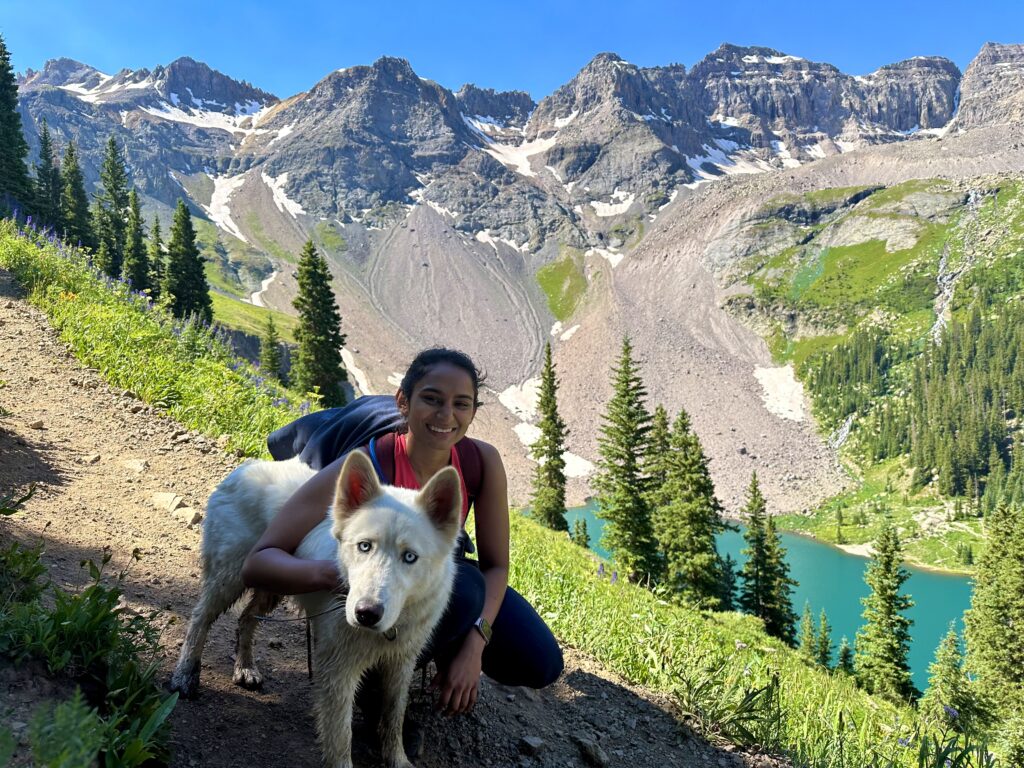Helping corporate America battle climate change
Related Posts
Connect With Us
April 28, 2025
“I‘ve definitely crafted my elevator speech,” Tanya Jagdish ’22, explained with a laugh. “I need it because when I tell people what I do, they say ‘What the heck is that?’”
“That” is Jagdish’s work as a climate change and sustainability consultant for accounting giant Ernst & Young (EY). Based in the company’s Denver office since graduating from Albion, Jagdish specifically works with helping clients evaluate and mitigate risks related to climate change.
Jagdish said historic heat waves and stronger hurricanes are widely understood for their immediate impacts on individual lives and communities. These changing weather patterns likewise carry new threats to a wide range of businesses.

Tanya Jagdish’s time at Albion College helped prepare her to be a climate change and sustainability consultant for Ernst & Young.
For example, Jagdish notes that stronger hurricanes mean more flooding, in areas where businesses never imagined their factories, warehouses, computer servers, and cell towers would be at risk. Stronger storms may cause more disruption in infrastructure and shipping, in turn affecting manufacturers, workers, and retail customers.
Planning for future climate change-related issues is no longer an option, nor is it easy, and that’s where Jagdish comes in. “Our clients are looking at how climate change can affect operations in 2050,” she said. “We have climate models that provide this data but that doesn’t tell you and your company what you need to do with it. We have clients who paid other firms for a climate risk analysis, but don’t know how to apply that data within their long-term business plan.”
She added, “I help explain to the client what that data means for them and what they can do about it.”
An international student from India, Jagdish studied biology, math, and environmental science at Albion while working at the Nature Center and completing a carbon emissions survey for the college. Passionate about research and hands-on problem solving, she watched classmates tackle corporate internship and consulting projects, knowing they weren’t for her.
“I kind of accidentally got this job,” she said, explaining that math professor Darren Mason introduced her to EY consulting partner Mike Juchno ’93 thinking her math skills might be of interest to his Michigan-based team. Instead, Juchno saw Jagdish’s sustainability-focused work and suggested she look into EY’s new forays into that field.
Two years later, Jagdish has a clearer understanding of how the private sector can be a sustainability ally. “When I was a student, the conversation would be centered around ‘Why don’t companies just reduce emissions?’–but it’s a lot more complicated than that,” she said.
For example, Jagdish points out that many industries that we depend on, such as steel and concrete, are inextricably reliant on plastics. “They genuinely can’t go to net-zero emissions because they’re so dependent on the plastics industry. A lot of the input for producing steel comes from the oil and plastic industries. You can’t move them into a new direction because there’s no new direction that is scalable and cost-effective. It’s really important to understand that solutions aren’t as simple.”
But there are solutions, and sometimes, they turn into wins. Jagdish noted that one of EY’s multibillion-dollar clients, based in Texas, was reluctant to explore electric-vehicle (EV) charging stations for customers, whom they believed were most interested in supporting the state’s petroleum industry.
“They didn’t think their customers were asking for EV stations now, but we were able to show them a likely future demand for EV chargers. We showed them how installing EV chargers would actually result in more store revenue in the long term,” she said. “Now, we have leadership support from the company. The leadership is investing in EV charging stations at approximately 300 locations across the country and plans to slowly expand year-on-year. In addition, they have decided to conduct more targeted research on customer behavior related to EV charging to further optimize revenue. I feel that our work has been instrumental in helping them make a more informed-and-strategic decision, one that they might not have considered without the insights we provided.”
Much of Jagdish’s work is devoted to helping clients better understand their bottom line, but she also incorporates the environmental justice issues that were part of her Albion education. This includes her courses in anthropology, environmental science, and an honors class focused on Creoles in the United States.
“Justice is something I’m really passionate about, and it has to be part of explaining ‘So what?’ to clients. How will people being driven out of their homes affect your customer profile? Why should you be concerned about that?” Those perspectives can be really helpful in understanding the social and environmental impacts of business decisions, allowing clients to see the bigger picture.”
Looking into her own future, Jagdish is still interested in hands-on industry work and a return to academia, where she might pursue her research interest into climate change and human migration patterns.
“I think I’ll probably come back to the private sector at some point, because that’s where we need to see real change and we need people to work on it from the inside,” she said.